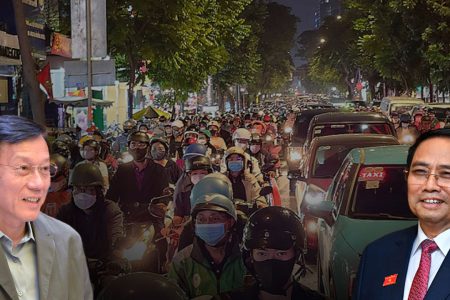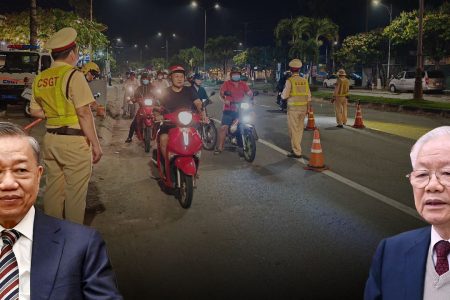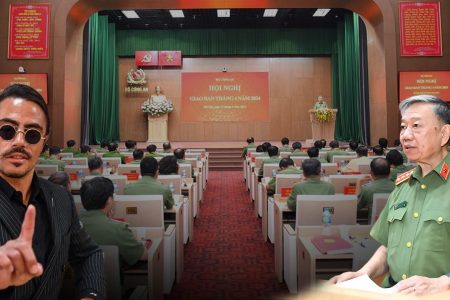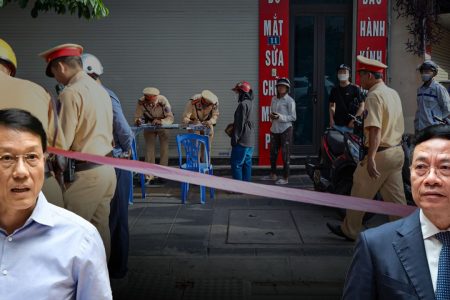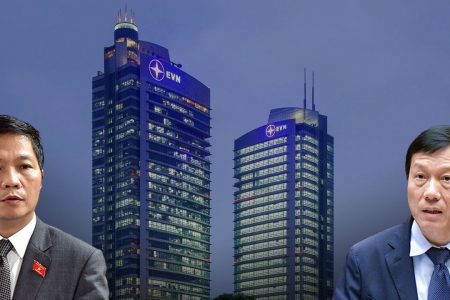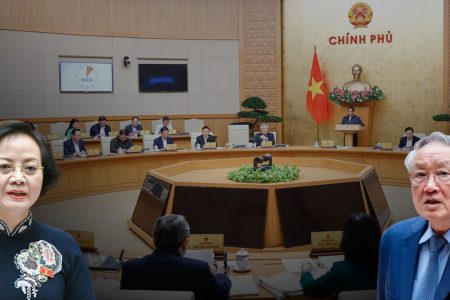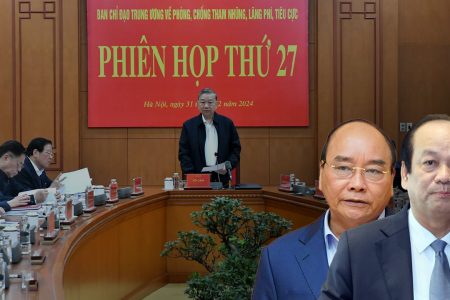
One year ago, on January 1, 2021, the revised Labor Law, passed by Vietnam’s legislative body National Assembly in November 2019, took effect. But so far, the establishment of independent trade unions, as provided for in the new Labor Law, still faces many obstacles.
Immediately after the revised Labor Law was passed by the parliament in November 2019, the US Embassy in Vietnam issued a statement welcoming “a historic law allowing the establishment of independent trade unions in Vietnam at the grassroots level.” But in the statement, the US Embassy also immediately emphasized “the importance of consolidating reforms in the Labor Law, including reforms through upcoming legislation on the establishment of, registration and operation of independent trade unions and full protection of the right to collective bargaining and the right to strike.”
One year after the revised Labor Law took effect, the question is whether the Vietnamese government has really accepted the formation of unions completely independent of the state’s trade unions.
Two pressures
In an article published on The Diplomat on January 1, 2022, exactly one year after the new Labor Law took effect, Joe Buckley, an expert on labor policy in Vietnam, reiterated that the changes above are the result of two pressures on the state of Vietnam. The first is free trade agreements, especially the Comprehensive and Progressive Agreement for Trans-Pacific Partnership (CPTPP) and the EU-Vietnam Free Trade Agreement (EVFTA). These agreements force Vietnam to comply with eight basic conventions of the International Labor Organization, such as the convention on forced labor, child labor, discrimination, and the right to form independent trade unions.
Before 2019, Vietnam had ratified six of those eight conventions. The above-mentioned free trade agreements force Vietnam to ratify the other two conventions related to the right to form independent trade unions, namely Convention 98, ie the Convention on the Right to Organize and Collective Bargaining, and Convention 87, that is, the Convention on Freedom of Association and on the Protection of the Right to Organize. The National Assembly ratified Convention 98 in 2019 and is expected to ratify Convention 87 in 2023.
The second pressure, according to author Joe Buckley, is pressure from below: Tens of thousands of spontaneous workers’ strikes over the previous 15 years have forced the Vietnamese state to improve its related mechanisms. such as setting up an agency to negotiate annual wages on minimum wage increases, improving collective bargaining, experimenting with grassroots unions, etc.
The author of The Diplomat acknowledges that the changes mentioned above have had a definite impact: over the past two years, the number of strikes has dropped to just over 120, compared with an annual average of 300- 350 cases between the 2010s and nearly 1,000 in 2011.
But according to Joe Buckley, the possibility of forming independent unions in the spirit of the 2019 Labor Law is still far away, because this law does not detail the establishment and registration of such organizations. These details will in principle be specified in government decrees. However, up to now, that is, more than a year after the revised Labor Law took effect, those decrees have not been issued.
Responding to RFI Vietnamese on January 8, 2022, lawyer Hoang Cao Sang, Law Office Hoang Viet Luat, one of the lawyers specializing in labor in Vietnam, said:
“According to Clause 4, Article 172 of the Labor Law, the Government shall stipulate dossiers, orders, and procedures for registration; competence and procedures for registration grant and revocation of registration; and state management of matters. finance and assets of the employee’s organization at the enterprise; division, separation, consolidation, merger, dissolution, right of association of the employee’s organization at the enterprise. So far, the government has yet promulgated this procedure.
Right now, I think, it’s still in preparation. Because according to the roadmap for signing labor conventions, it will not be until 2023 that Vietnam will sign Convention 87, which is the last of four pairs of conventions that Vietnam has signed for the integration process. This last convention is the one directly related to the establishment of independent trade unions. Like it or not, changing a policy takes a certain amount of time. especially for Vietnam.”
“Independence” is “reactionary“?
In July 2020, an organization called the Vietnam Independence Union (VIU), was established. This independent union asserts that it is a “non-profit and non-political organization, with the goal of protecting the legitimate interests of Vietnamese workers.”
In an open letter dated November 1, 2021, the Vietnam Independent Trade Union asked the government to quickly issue decrees that “detailed and guide employees to exercise their lawful rights and obligations provided by the Code.”
This union said that, because there are no such decrees, workers across the country “even if they want to, still cannot establish or join and operate in grassroots worker representative organizations as the Code regulates.”
But as noted by expert Joe Buckley in an article published on The Diplomat, contrary to information published by the official English press, Vietnam has not yet allowed the establishment of independent trade unions.
In fact, according to the author of the article, in the revised Labor Law, there have been some changes in the right to freedom of association. Among those changes, for the first time, the law allows workers to establish their own organizations that are not affiliated with the Vietnam General Confederation of Labor but claims that calling them independent unions is a misinterpretation of the law (or a deliberate misinterpretation of the law).
Joe Buckley also notes that the state-controlled media also repeatedly emphasizes that representative workers’ organizations are not unions, that only the General Confederation of Labor is the legitimate representative of workers. Such workers’ representative organizations are only established at the grassroots level, i.e. individual enterprises, and have a more limited operating framework than real trade unions.
The state-controlled press in the past year also competed to condemn the Vietnam Independent Trade Union as “just a cover for a plot against the Party, the State and our people” as “a premise for the formation of an organization against the Vietnam General Confederation of Labor.”
Specifically, in an article dated October 19, 2021, the Capital Security newspaper also affirmed that through the establishment of independent trade unions, “reactionary and hostile forces are trying to reproduce what” The Polish Solidarity Trade Union” which it did in the Eastern European country in the 1980s, organized the activities that led to the loss of leadership of the Polish United Workers’ Party and the collapse of the Polish socialist system. communism in Poland in 1989.”
This newspaper also denounced: “Their deep scheme is to form opposing political forces and organizations in the country in order to carry out the “peaceful revolution” and “street revolution” to overthrow the communist regime and abolish the political system in Vietnam.”
But lawyer Hoang Cao Sang denied that allegation:
“I think it’s wrong to say that. It’s wrong both in terms of theory as well as in the provisions of the law and viewpoints and policies when Vietnam integrates into the world.
Firstly, theoretically: In the past, when there were only state-owned enterprises, there were no private enterprises, then many views believed that private enterprises should not be allowed to operate because they are competitors for the state-owned firms. Then, because of the actual need, private enterprises were born. At this time, some views are reluctant to accept but say that state-owned enterprises will be the mainstream.
But now it’s completely different. State-owned enterprises are all at a loss, private enterprises are the main ones. And thanks to that, Vietnam has developed as it is today. In other countries, they also have independent unions, but they don’t see any opposing unions if the parties focus on the interests of the people.
Secondly, on the legal side: During the process of integration and signing of trade agreements, Vietnam has signed 7/8 Labor Conventions, including provisions on independent trade unions, and immediately in the Labor Code, the National Assembly has dedicated Chapter XIII to the establishment and joining of workers’ organizations at enterprises.
The third is in terms of policy: Up to now, Vietnam is on the path of integration with the world, improving human rights and especially the rights of workers. And to ensure the rights of workers, political organizations, the National Assembly has agreed to sign the Conventions on independent trade unions, so if you say it is an independent trade union against the state, you are the one against it. government. As for the management of this trade union, it is necessary to have an adjustment law, specifically a labor law that regulates this issue.”
International supervision?
Thus, in the current context, there are still many obstacles on the way to forming independent trade unions in Vietnam. In other words, the revised Labor Law, which took effect one year ago, has not had any impact on this issue. The problem is that the backlash from the state press makes one question: Does the Vietnamese government really want to facilitate the birth of independent trade unions? According to lawyer Hoang Cao Sang, there should be international supervision on this issue:
“Maybe in terms of sub-divisions, not, because opening, it has to change the way of management and administration, but management on this issue is more sensitive and complicated. But in general, Vietnam has to do it. Up to now, Vietnam has signed 7/8 labor-related conventions, only Convention 87 is the convention on the right to form associations or in other words, the right to establish free trade unions is not According to the announcement of the Ministry of Labour, Invalids and Social Affairs, this Convention 87 will be signed in 2023. But I think that in order to implement these issues well, those two organizations must have supervision of the international organizations so that Vietnam can better implement the establishment of independent trade unions to better protect workers’ rights.”
However, as noted by expert Joe Buckley on The Diplomat, in the immediate future, the most significant changes will probably come from the Vietnam General Confederation of Labor. In the article for The Diplomat, the author concludes: “If progressive elements in the Union use the existence of representative workers’ organizations (at least on paper) to promote the Union to try to become a truly representative workers’ organization, we will enter an exciting period of labor policy and unions in Vietnam.”
Thoibao.de (Translated)







